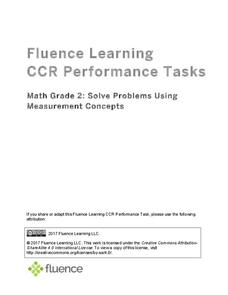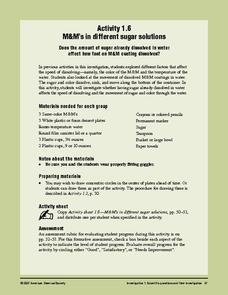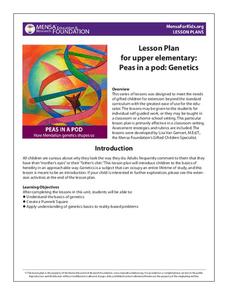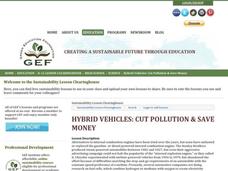Fluence Learning
Writing About Literature: Nature in the Writings of John Muir and Emily Dickinson
As an assessment of their skill in crafting a compare and contrast essay, class members read and compare the portrayals of nature in excerpts from naturalist John Muir's My First Summer in the Sierra and from poet Emily Dickinson's...
Fluence Learning
Solve Problems Using Measurement Concepts
Young mathematicians demonstrate what they know about measurement with a four-task assessment that focuses on estimation, length, and inches.
Mathematics Assessment Project
Temperatures
As a middle school assessment task, learners first examine line graphs of monthly temperatures for two locations, and then match box plots to each line plot.
Mathematics Assessment Project
Multiplying Cells
Powers of two: it's a matter of doubling. A short summative assessment task asks pupils to determine a process to calculate the number of cells at given time intervals. They use powers of two in order to calculate the number of...
University of Georgia
Land Biomes Project
Challenge scholars to research a biome and create a presentation for the producers of Survivor to choose their ecosystem for the next season's show. The materials include outlines, worksheets, and grading rubrics for individuals as well...
Curated OER
Doing Science Safely
Young scholars are introduced to how to practice science experiments safely outside of school. In groups, they create a poster showing the safety guidelines and responses to specific situations should they occur. They also practice...
Curated OER
Interactions of Science and Technologies
Middle schoolers explore how science and technology interact. They discuss important inventions, discoveries and technologies. They research a specific technological advance, or invention, and prepare a presentation that includes...
MENSA Education & Research Foundation
The Cell: the Building Blocks of Life
Do you have early finishers asking what they can do next, or any budding scientists eager to learn more about plant and animal cells? Then here is a cell unit for you! The packet provides scholars with everything they need in order...
Curated OER
Ocean Commotion Activity - Dioramas
Groups make a model of an Ocean Commotion exhibit based on what they saw during the fieldtrip. These dioramas can be used as an informal assessment of student knowledge acquired at Ocean Commotion.
Cherokee County Schools
Simple Machines Project
The choice is simple: create a PowerPoint presentation, write a book, or invent a compound machine. Whichever project your young scientists choose, they will be engaged in creatively demonstrating their knowledge of simple...
Curated OER
Dante's Peak Movie Review
Middle or high school volcanologists watch the 1997 film, Dante's Peak. They make observations as they watch and then write a movie review, focusing on what was accurately represented. They also point out what facts were stretched by...
American Chemical Society
M&M's in Different Sugar Solutions
To conclude a mini unit on the dissolving of M&Ms® candy coating, this lesson investigates whether or not the concentration of sugar in the solvent affects the dissolving rate. Consider having older science learners write their own...
Cornell University
Classification
Explore the scientific method of classification. An interactive activity asks learners to create a classification system for a group of objects and develop a flow chart to communicate their systems. In addition, individuals use a...
MENSA Education & Research Foundation
Peas in a Pod: Genetics
Can peas have grandparents? Learn about inherited traits and heredity with a set of activities focused on Mendelian genetics. As your class learns about the process of passing traits along in Punnett squares, they take on the role of...
NASA
Cleaning Water
Give young scientists a new appreciation of fresh, clean drinking water. After learning about the ways astronauts recycle their air and water, your class will work in small groups creating and testing their very own water...
NASA
Cleaning Water
From their sweat to the water vapor in their breath, astronauts recycle every possible drop of water while in space. After watching a short video describing the different ways materials are recycled and reused in space...
Baylor College
HIV/AIDS in the United States
In the final of five lessons about HIV/AIDS, groups create presentations to share data about the infection rates in the United States, examining demographic and geographic trends over the past ten years. Depending on how much time you...
Lerner Publishing
Meet the Dinosaurs
Take your class of youngsters on a prehistoric adventure with this four-lesson series on dinosaurs. Accompanying the Meet the Dinosaurs books by Don Lessem, these lessons engage children in writing their own dinosaur books,...
Curated OER
Hybrid Vehicles: Cut Pollution and Save Money
Math and science meet in this lesson on hybrid electric automobiles. This 24-page resource provides everything you need for teaching a lesson that compares the use of internal combustion engines to hybrid electric engines. Participants...
Beyond Benign
Is It Easy Being Green Game Show
Is it possible to create an environmentally friendly shampoo? Learners accept this challenge in the fifth instructional activity in a green chemistry series of 24. The analysis of their shampoo ingredients must address pH, exothermic...
Curated OER
Using Technology in Science
You can spice up your science content by incorporating technology into your lesson plans.
Ontario
Computer Hardware —Computer Studies
What kind of components are needed for a computer? Through a differentiated lesson plan, individuals learn about six hardware computer components. They conduct research to determine the range of options for the components. Class...
MENSA Education & Research Foundation
Ecosystems
Explore the Earth's different ecosystems through four lessons, an assessment, and extension activities. Lessons include informative text and step-by-step instructions to apply knowledge in interactive, and thought provoking ways; such as...
Curated OER
A Colony is Born : Lesson 5 - Dear Mem
Discover colonies! Young historians will listen to a primary source journal entry read aloud with a backdrop of wave sounds. They discuss the entry, add historical facts to a chart and personal insights to another. Then they listen to...

























